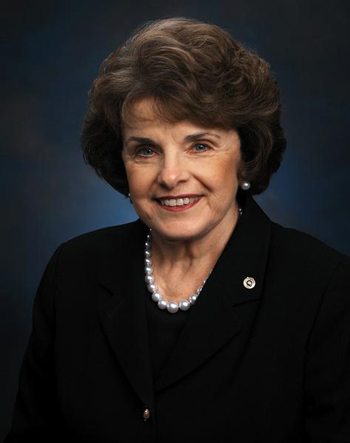August 5, 2023 - Washington—Senator Dianne Feinstein (D-Calif.) and Representatives Suzan DelBene (D-Wash.), Adam Schiff (D- Calif.) and Jared Huffman (D-Calif.) are leading a group of 19 lawmakers calling on Agriculture Secretary Tom Vilsack to update standards of care for captive marine mammals, such as whales and dolphins, to better reflect the best available science. These standards include tank size, water quality, hours of interaction with the public and access to shade.
Calif.) and Jared Huffman (D-Calif.) are leading a group of 19 lawmakers calling on Agriculture Secretary Tom Vilsack to update standards of care for captive marine mammals, such as whales and dolphins, to better reflect the best available science. These standards include tank size, water quality, hours of interaction with the public and access to shade.
Senator Dianne Feinstein (D-Calif.)
“Significant progress has also been made in other areas of marine mammal biology and ecology since USDA last updated its regulations,” the members wrote.
The members continued, “Updates to handling and care standards for captive marine mammals do not reflect current science and are long overdue. We again urge you to develop a humane and science-based rule to modernize these outdated regulations and protect these highly intelligent and social animals.”
A provision in the fiscal year 2023 omnibus secured by Feinstein, DelBene and others requires USDA to prioritize updating these standards and provide an update to Congress within six months. The report was due in June 2023 and the Department of Agriculture has not provided an update.
The department proposed an update in 2016, which was eventually shelved by the Trump administration.
Full text of the letter is available here and follows:
August 3, 2023
The Honorable Thomas J. Vilsack
Secretary
U.S. Department of Agriculture
1400 Independence Avenue, SW
Washington, DC 20250
Dear Secretary Vilsack:
We write as a follow-up to a letter dated November 3, 2021 requesting an update on efforts at the U.S. Department of Agriculture (USDA) to revise the handling and care standards for captive marine mammals and ensure such standards reflect the best available science. These standards of care were last meaningfully updated in 1984, nearly forty years ago, and although the USDA proposed changes in 2016, the new regulations were never finalized. As you know, the Fiscal Year 2023 omnibus bill directed USDA to prioritize the development of new regulations and provide Congress with an update within six months, a deadline which has now passed.
Since we sent our last letter, several well-documented captive marine mammal deaths and illnesses have demonstrated the costs of inaction. In multiple investigations, the USDA’s Animal and Plant Health Inspection Service found that tanks at various aquariums had insufficient shade or protection from reflected light, causing eye lesions and potentially exacerbating solar dermatitis, skin ulceration, or other issues. Previously proposed changes to the outdoor facilities regulations would have required consistent shade to be available for each animal in an enclosure, but these proposed changes were never finalized.
Significant progress has also been made in other areas of marine mammal biology and ecology since USDA last updated its regulations. For example, research within the last 20 years indicates that marine mammals in the wild travel far more widely than previously understood, including diving to astounding depths. In the last 10 years, researchers have found that orcas can achieve depths of more than 3,500 feet when they dive, more than 1,000 feet deeper than previously believed. Under current regulations, however, the minimum tank depth for a captive whale or dolphin is only one half of the length of an average-sized adult, or 12 feet for orcas.
In short, updates to handling and care standards for captive marine mammals do not reflect current science and are long overdue. We again urge you to develop a humane and science-based rule to modernize these outdated regulations and protect these highly intelligent and social animals.
Thank you for your consideration. We look forward to your response.
Source: Senator Dianne Feinstein








